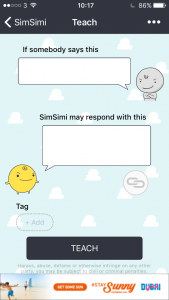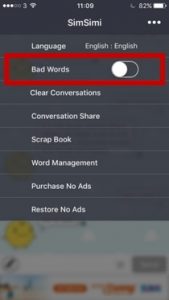Explained: What is SimSimi?

SimSimi is an artificial intelligence chatting robot also known as a chatbot. The messenger app currently has a PEGI rating of 16 on the Google Play and iTunes stores.
Chatbots are computer programmes that simulate human conversations on the internet. With the development of artificial intelligence, chatbots are becoming more prominent and many tech firms are investing more in this particular type of technology. Many chatbots are created with a specific purpose in mind, most commonly to provide information or act as customer service point.
Why Do Young People Like it?
SimSimi is free to download to smartphone and can be accessed via desktop computer. The app mascot is a colourful, anime style character which is appealing to young people. The popular app encourages users to continue conversations by using playful language, however much of the language on the app is offensive or contains sexual content. SimSimi is also anonymous, making it easy for users to leave hurtful comments about others.
How Does it Work?
Using artificial intelligence, users can begin a conversation with the chatbot. Users can ask anything and the chatbot will respond. The responses can range from a helpful reply to offensive content. There is an option to switch off ‘bad words’, this can be done using the app settings.
 Users can also ‘Teach’ the chatbot responses and replies. Users can input any text/phrases/response they wish, the chatbot may then use this as a response to other users if the asked that particular question. This particular function is causing concern among schools and parents, with many young people being able to view anonymous responses about themselves when they type their name into the app.
Users can also ‘Teach’ the chatbot responses and replies. Users can input any text/phrases/response they wish, the chatbot may then use this as a response to other users if the asked that particular question. This particular function is causing concern among schools and parents, with many young people being able to view anonymous responses about themselves when they type their name into the app.
Can I Report Content?
The app does offer an option to flag responses which are considered: ‘Not interesting // sexually explicit // vulgar or violent // Cyberbullying // other’. There is currently very little information available on the website about its terms of service or how it deals with reporting content. The app does state: ‘Harass, abuse, defame or otherwise infringe on any other party, you may be subject to civil or criminal penalties. ‘ Much of the content on the app contains offensive language and sexual content may cause upset for some users.
Users do have the ability to use the ‘Name Protect Tool’. This function allows users to input their name to SimSimi via the settings and will ensure no other user can teach SimSimi a response about your name.
More information relating to reporting on the app, cyber-bullying and user privacy can be found here: blog.simsimi.com/simsimi-user-faq.html
What Are the Risks?
SimSimi can be fun to use, however as an anonymous app it can be used as a platform for bullying. Conversations on the app can be easily shared on other social networks (Facebook, WhatsApp, Messenger, and Twitter among others).
For concerned parents, we recommend talking to your child about the apps and social networks they use. Parents should familiarise themselves with the apps their children want to use before making a decision whether it is appropriate for their child to use. If your child is using the app, caution should be taken. Users should also ensure the bad words function is switched to almost never to help minimise the risk of encountering upsetting or offensive content. Sim Simi users should also consider using the ‘Name Protect Tool’.
recommend talking to your child about the apps and social networks they use. Parents should familiarise themselves with the apps their children want to use before making a decision whether it is appropriate for their child to use. If your child is using the app, caution should be taken. Users should also ensure the bad words function is switched to almost never to help minimise the risk of encountering upsetting or offensive content. Sim Simi users should also consider using the ‘Name Protect Tool’.
What Can I Do if my Child Is Being Bullied Online?
1. Don’t Reply: Young people should never reply to messages that harass or annoy them. The bully wants to know they have upset their target. If they get a response it feeds into the problem and makes things worse.
2. Keep the Messages: By keeping nasty messages your child will be able to produce a record of the bullying, the dates and the times. This will be useful for any subsequent school or Garda investigation.
3. Block the Sender: No one needs to put up with someone harassing them. Whether it’s mobile phones, social networking or chat rooms, children can block contacts through service providers.
4. Report Problems: Ensure your child reports any instances of cyber-bullying to websites or service providers. Sites like Facebook have reporting tools. By using these, your child will be passing important information to people who can help eradicate cyber-bullying.
Children need to understand the emotional damage cyber-bullying, and all other forms of bullying, can cause. All forms of bullying hurt, all cause pain and all should be stopped. By stressing this to your child – and by enforcing the importance of not standing by while someone else is being bullied – it will encourage their responsible internet use.
Get more advice on dealing with cyber-bullying here: webwise.ie/parents/cyberbullying-advice/





